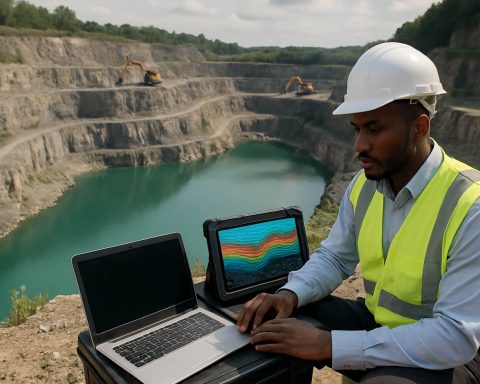- America’s tech giants, including Apple, Nvidia, and TSMC, are pledging significant investments to strengthen U.S. tech manufacturing, with commitments totaling hundreds of billions of dollars.
- Apple’s $500 billion plan includes creating 20,000 jobs and increasing its advanced manufacturing fund, despite a drop in its stock price.
- The ‘Stargate’ initiative, led by Oracle and OpenAI with SoftBank, promises to generate approximately 100,000 jobs, marking a shift in U.S. tech production.
- Nvidia is investing massively to boost the U.S. supply chain, while TSMC plans a $200 billion expansion, focusing on its Arizona operations.
- Global trade tensions and tariffs are influencing these investments, as companies aim to reduce costs by building facilities in the U.S.
- Despite the potential for growth, semiconductor stocks like Nvidia, Broadcom, and Intel are experiencing declines due to international trade uncertainties.
On a brisk Wednesday evening, the financial markets wavered, yet amidst the turbulence, a bold proclamation echoed from corridors of power: America’s tech giants are cementing their roots deeper into the nation’s soil. At the heart of this development lies a staggering commitment from firms like Apple, Nvidia, and TSMC. These titans, stirred by a dynamic blend of tariffs and strategic foresight, have mapped out investments soaring into the hundreds of billions, heralding what could be a transformative era for the U.S. economy.
Peering into the kaleidoscope of numbers and intentions, Apple’s audacious $500 billion pledge over the next four years stands out. This initiative lays the foundation for a sprawling manufacturing center, a doubling of its advanced manufacturing fund, and the ambitious addition of 20,000 American jobs. Yet, in a paradox characteristic of volatile financial climates, Apple’s shares sank over 7% in late trading, buffeted by their intricate web of international dependencies.
In harmony with this massive investment symphony, Oracle and OpenAI, joined by SoftBank, declared their hand in a similarly gargantuan venture codenamed ‘Stargate’, promising to spark the creation of an estimated 100,000 jobs almost overnight. This movement marks a pivotal shift towards rekindling America’s core tech manufacturing capabilities.
Nvidia, the powerhouse in graphics processing, announced its own breathtaking commitment of hundreds of billions to enrich the U.S. supply chain. Meanwhile, TSMC, the revered kingpin of semiconductors from Taiwan, has unveiled plans to bolster its U.S. operations by $200 billion, with a substantial portion earmarked for expanding its Arizona base.
These declarations, however, come shrouded in a critical context: tariffs. As tectonic geopolitical shifts deliver hefty tax implications for companies importing goods, the allure of bypassing these costs by constructing plants on American soil grows irresistibly attractive. Here lies a poignant reflection of the evolving landscape of global trade; businesses are increasingly driven to adapt their strategies, often finding opportunity in pressure.
But for all the grand investments promising growth and new jobs, the stock market murmured unease; semiconductor stocks like Nvidia, Broadcom, and Intel noted significant retreats, their shares faltering by up to 5%. Investors, wary of the ongoing international trade dynamics and the immediate impacts of tariffs, found themselves in a dance with uncertainty.
The tale unfolding is rich in complexity and potential. For the U.S., this influx of capital is not just about circumventing economic barriers but nurturing an ecosystem for future innovation. Yet, whether this heralds a true renaissance in domestic tech manufacturing or is simply a temporary adjustment to the winds of policy remains to be seen. As fortunes rise and fall with the tick of a trading clock, one thing is certain: the landscape of American tech and industry is on the brink of another evolution, steered by a desire to grow and the necessity to adapt.
America’s Tech Renaissance: A Double-Edged Sword?
The Tech Giants’ Commitment to U.S. Soil: Implications and Insights
Amidst the fluctuating financial markets, tech giants like Apple, Nvidia, and TSMC are making substantial investments in the U.S., promising a profound shift in the tech industry. This article delves deeper into the context and potential impact of these moves, exploring crucial aspects that the source material may not fully cover.
How-To: Leverage the Tech Boom for Career Growth
1. Upskill in Relevant Technologies: With companies like Nvidia and TSMC expanding, focusing on skills in AI, semiconductors, and advanced manufacturing can boost job prospects.
2. Explore Emerging Tech Hubs: Areas like Arizona (site of TSMC’s expansion) will become new industry hotspots, offering various employment opportunities.
3. Stay Informed About Tariff Impacts: Understanding international trade dynamics can provide insights into industry trends and job stability.
Real-World Use Cases and Their Importance
The massive investments by Apple and its peers are not just financial maneuvers—they are strategic steps towards:
– Reducing Supply Chain Risks: By localizing production, these companies mitigate the risks associated with geopolitical tensions and international tariffs.
– Enhancing Innovation: A local presence can foster innovation through collaborations with U.S.-based R&D initiatives and universities.
– Sustainability Initiatives: The emphasis on U.S. manufacturing may align with more environmentally sustainable practices by shortening supply chains and leveraging local resources.
Market Forecasts & Industry Trends
The projected outcomes of these investments are significant:
– Job Creation: Initiatives like Oracle and OpenAI’s ‘Stargate’ aim to create 100,000 jobs, amplifying economic growth in regions they impact.
– Tech Hub Development: States like Arizona and North Carolina are prime candidates for tech hub transformations due to these investments.
– Long-term Growth Potential: While initial stock market reactions are cautious, the long-term potential for tech industry growth is robust, contingent on stable trade relations.
Reviews & Comparisons: Tech Manufacturing Landscape
– Current Leaders: TSMC and Nvidia are front-runners in semiconductor and AI technology, prioritizing U.S. expansions to cement their leadership.
– Competition Factors: Domestic players like Intel are simultaneously scaling operations, highlighting fierce industry competition for technical talent and resources.
Controversies & Limitations
– Tariff Challenges: While bypassing tariffs is a short-term win, long-term global trade policies remain a risk.
– Stock Market Volatility: Company stocks, like Apple’s and Nvidia’s, reflect the uncertainty in international dependencies despite domestic investments.
Pros & Cons Overview
Pros:
– Job creation and economic growth in local U.S. economies.
– Reduced dependency on volatile international supply chains.
– Fostering of innovation through U.S.-based R&D operations.
Cons:
– Short-term financial instability endured by companies adapting to new tariffs.
– Potential oversupply if global demand does not match increased production capacity.
Insights & Predictions
– Tech Manufacturing Renaissance: These investments could signify a durable shift in U.S. manufacturing capabilities, aligning with national interests in developing domestic tech resources.
– Economic Resilience Enhancement: Strengthening U.S. production can build resilience against international disruptions.
Conclusion: Actionable Recommendations
– Invest in Tech Education: As tech giants expand operations domestically, there is an imminent need for skilled workforce in technology and manufacturing sectors.
– Monitor Trade Policies: Investors and workers alike should stay informed on tariff changes and global trade negotiations to anticipate market shifts.
– Explore Investment Opportunities: Economic revitalization in manufacturing hubs presents potential investment opportunities.
For more insights on tech industry trends, visit the Apple and Nvidia websites.
In conclusion, the strategic investments led by tech giants in the U.S. herald significant changes, rich with opportunities and challenges. By taking proactive steps to adapt to this evolving landscape, individuals and businesses can reap the benefits of this transformative era.













